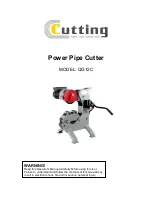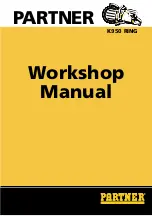
3
Pipe Cutter Inspection
1. Make sure Power Drive is unplugged.
2. Inspect the cutter wheel to insure it is not dull, bent or damaged.
3. Check that the cutter frame rollers are free to rotate under the pipe. Clean debris, pipe
scale and dirt from rollers.
4. Ensure pipe support bearings are free to move and are clean of dirt, pipe scale and debris.
5. Check fluid levels in the hydraulic pump. Insure fluid level is to the FULL.
6. Inspect the power cord and plug for damage. If the plug has been modified, is missing the
grounding pin or if the cord is damaged, do not use the machine until the cord has been
replaced.
Work Area Set-Up
Locate a work area that has the following:
• Adequate lighting.
• No flammable liquids, vapors or dust that may ignite.
• Grounded electrical outlet.
• Clear path to the electrical outlet that does not contain any sources of heat or oil, sharp
edges or moving parts that may damage electrical cord.
• Dry place for machine and operator. Do not use the machine while standing in water.
• Level ground. Do not use on bench or elevated surface.
Using Pipe Supports
Pipe supports must be used to prevent cutter wheel damage. Failure to properly
support the pipe will result in shortened wheel life. When cutting pipe in lengths of
8
”
or longer, additional pipe supports must be used.
As shown in Figure 1 and Figure 2, the cutter and pipe supports must be positioned so that
the pipe sections have a tendency to fall away from the cutter blade as the pipe is cut. If the
cutter wheel is pinched by the pipe, it will damage the cutter wheel.
Fig 1
Fig 2

























